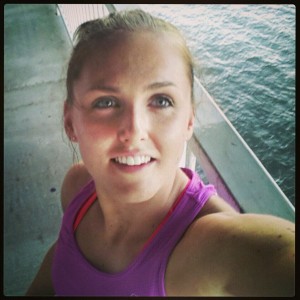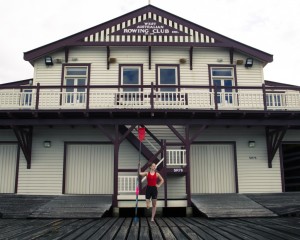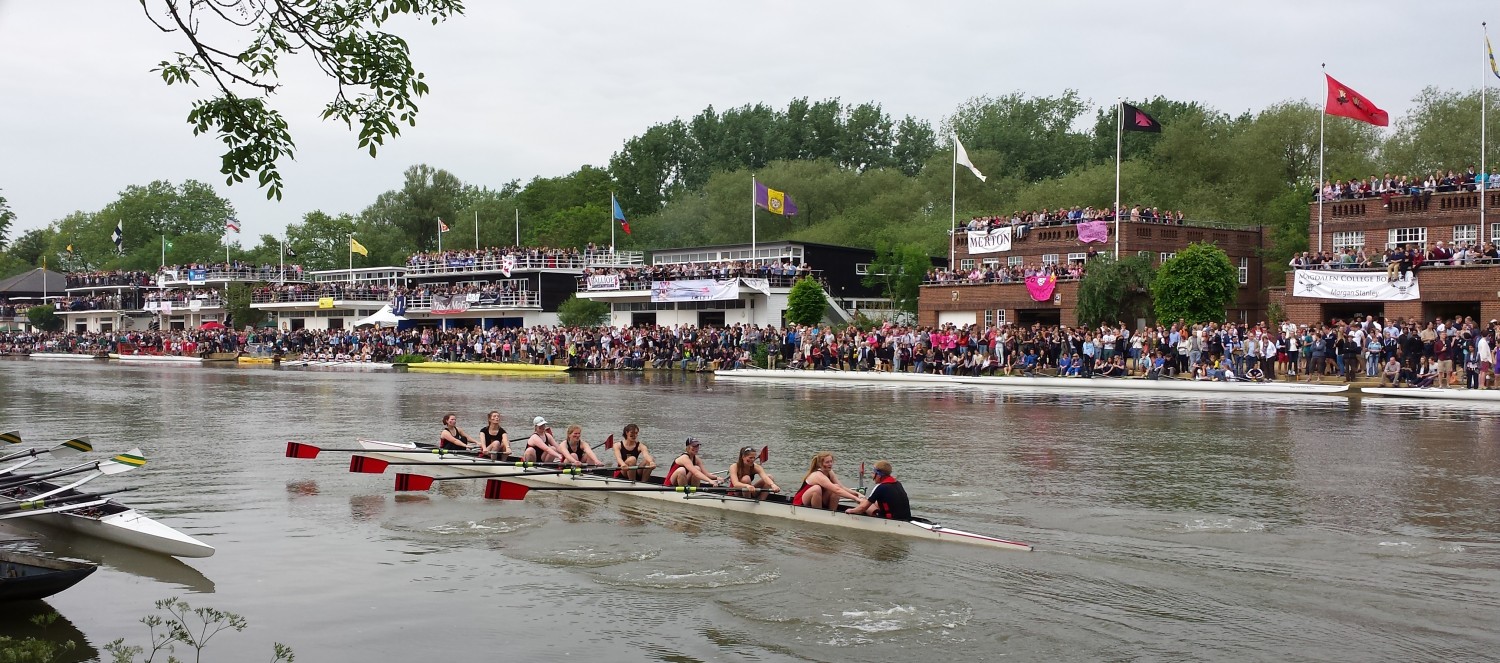Kathleen O’Kelly-Kennedy – A Para-Rower’s Story
by Howard Aiken
People come to rowing via a variety of routes, some conventional, some unconventional and some downright discouraging. Kathleen O’Kelly-Kennedy is one of that last group. She came into the sport of rowing because last year someone thought a 3k erg test would be a useful measure of her fitness.
some downright discouraging. Kathleen O’Kelly-Kennedy is one of that last group. She came into the sport of rowing because last year someone thought a 3k erg test would be a useful measure of her fitness.
Kathleen O’Kelly-Kennedy is a 29 year-old Australian Paralympian wheelchair basketball player. At birth one of her legs was shorter than the other, and her right foot was amputated when she was eighteen months old. She was part of the bronze-medal-winning Australia women’s national wheelchair basketball team (known as the Gliders) at the 2008 Summer Paralympics in Beijing.
Although not selected for the Gliders team that played at the 2012 Summer Paralympic Games in London, she won a Bronze Medal with Elecom Roma in the Men’s European Championships that year and returned to the Gliders line up for the Osaka Cup in 2013 and for the World Championships held in Canada in June 2014.
After the Word Championships, Kathleen felt burned out, physically and mentally, and was looking for a new sport. Thanks to the friendly reception she received at the West Australian Rowing Club in Perth, the 3k test wasn’t the end of her interest in rowing, but the beginning.
She’s emphatic that it was the West Australian Rowing Club and its members as much as the sport itself which attracted her into rowing. She says “I felt embraced and supported from the moment I walked in. They take care of each other and their genuine love and passion for rowing is written all over their faces each time we sit down for a quick coffee and debrief of the morning’s row. I became a bit of a ‘project’, people were constantly bouncing ideas off each other as to how I could adapt to rowing as an amputee.”
As to the rowing, it is about as different from her previous sport as it is possible to be. Kathleen has had to get used to enjoying sport outdoors, building her aerobic endurance and increasing her leg strength. All this requires a regular training programme which sees her out on the water most mornings with her coaches, Triona and Graham Walker, and her training buddy Kevin, a para rower from Ireland with cerebral palsy. She still trains with her wheelchair basketball team-mates in the gym and she also reviews her progress with her exercise therapist who helps her stay injury-free. As part of her aerobic training she claims to be making friends with the erg (an achievement still beyond many long-established rowers) and also uses training bikes in the gym, which she rides one-legged, as she finds that easier than cycling with a prosthetic leg.
As an elite athlete now exploring a new sport she has some interesting views on sport, life and other people’s perceptions of ‘disability’. “Firstly” she says “I don’t see myself as disabled – I believe that life is all about perspective. It isn’t about what’s said, it’s about what you hear. It isn’t about what you look at that’s important; it’s what you see. So I don’t feel like I have a disability. I feel like I have a unique opportunity to do things outside the box.”
She also has a message for other para-athletes about over-identifying with one’s role in sport. “It wasn’t until I was not selected for the 2012 Paralympic Games that I realised I had been placing too much of my self worth on whether or not I was on the Australian Team. On a deep subconscious level, I had been justifying having one leg through my involvement in Paralympic sport. Don’t get me wrong, I love wheelchair basketball, I love competing and being an athlete, but there was also a part of me that put way too much emphasis on that defining me. I also felt it was important to always seem happy and okay with my leg. So when I wasn’t selected for the London Games, my self worth came into question. I had forgotten that, Paralympics or no Paralympics, I am still important and valued as I am”.
It’s quite a thought, certainly for readers who are not disabled, that Kathleen felt she had to “justify” having one leg through her achievements, but that really is how she felt: “it is what it is and that’s how many people with disability have or do feel. So it’s important to convey that (without sugar coating it), so that people can better understand the lives of people with disability. I’m not saying I felt that I had to justify being born, I’m saying that I felt that I had to keep doing extraordinary things in order to feel accepted by myself and others. It’s not how I feel now of course, and it’s something I probably would have denied vehemently at the time because it was quite deep seeded, but I do believe that there are more people with disability out there like me who do or have done the same thing with that feeling inside them. In this case, ‘justifying’ is the right word and I hope the readers don’t view it as horrifying but as something that is real and genuine and an issue that needs to be brought to light more.
 The Paralympics have been an incredible influence on so many people with disability, including myself and will continue to be. But it’s important to not get lost in the hype and remember that its influence doesn’t have to lead to you attending one – it’s influence can simply mean that you re-assess what is possible in your life, what your dream is, what you really want to do…and to go for it. If your dream is like mine – to be an athlete at the highest level, then great! But whether you make it or not, does not impact on your worth.
The Paralympics have been an incredible influence on so many people with disability, including myself and will continue to be. But it’s important to not get lost in the hype and remember that its influence doesn’t have to lead to you attending one – it’s influence can simply mean that you re-assess what is possible in your life, what your dream is, what you really want to do…and to go for it. If your dream is like mine – to be an athlete at the highest level, then great! But whether you make it or not, does not impact on your worth.
Most of the time I don’t think about my leg, it’s who I am, and like I said I think outside the box and still do all that I want to do. But some days are just crappy, it doesn’t fit right, it feels irritated or sore, I don’t like how it looks, someone’s said something insensitive or ignorant etc. and on those days, rather than try and ignore my feelings of frustration or sadness, I now embrace them. Because, as mum would say, there’s nothing wrong with having a ‘bad leg day’! Being positive 100% of the time is unrealistic and I think unhealthy. It’s okay to feel sad, have a cry, get frustrated and maybe even eat a little too much chocolate. But I always try to make sure that I start fresh the next day. Since I started embracing my ‘bad leg days’ I’ve had less of them and I think there’s something to that!“
As a relative newcomer to rowing, Kathleen is already absorbing and enjoying the spirit of the sport. As rowers, we are in what is usually a non-contact sport and there is very little we can do to affect the performance of other boats we compete against. We row against the clock, the conditions and ourselves. If we have ‘a good row’ we know it and win or lose there’s great satisfaction to be had whether it’s from a personal best time, or a crew really working well together or just a good outing on a fine day. Kathleen captures that spirit. “Currently I’m not sure what the future holds for me in rowing, but I’m enjoying it and I am giving my absolute best. I used to think if the end goal wasn’t reached then I had failed. I don’t think like that anymore. If I know I have given something my absolute best and I’ve had a great time doing it, then I believe there is no failure in that, no matter what the outcome.”
It is a message most rowers will identify with. However, Kathleen has brought the same determination to her rowing that she brought to wheelchair basketball. She attended the New South Wales State Championships and won a silver in a single and gold in mixed fours. She also attended the Australian team trials and is now the female reserve for the LTA mixed four going to world championships this year. So it is very likely we’ll be hearing more of Kathleen O’Kelly-Kennedy.
This interview was originally published in Issue 6 of Row360 magazine ( row-360.com )
